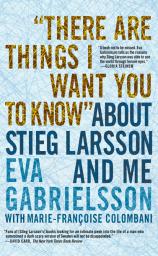Reading Group Guide
Discussion Questions
"There Are Things I Want You to Know" About Stieg Larsson and Me

1. Gabrielsson opens the book with I-Ching hexagram 51, which represents shock and thunder. How does it set or fit with the tone of the rest of the book?
2. In Gabrielsson’s introduction to the paperback edition, she says her intentions are to remind people that: “great plans are not required for great success,” “laws must change to respect people and their life work,” “it’s always right to speak out,” and “we must stay true to ourselves” (page xii). Choose one of these ideas and discuss how it is explored in the book.
3. In Colombani’s foreword, she notes that Larsson’s trilogy “is an allegory of the individual’s eternal fight for justice and morality, the values for which Stieg Larsson fought until the day he died” (page xiv). How do we see these values expressed in his life with Gabrielsson?
4. Much of Gabrielsson’s remembrances are structured throughout the book as vignettes. What is that meant to convey? Do you think it’s successful?
5. Drinking coffee held a strong place in Gabrielsson and Larsson’s relationship. What do you think coffee represented to them? Do you have a seemingly benign activity in your life that also holds as much meaning?
6. On page 27 Gabrielsson writes regarding finding her soul mate, “How can anyone calmly accept that his or her life and very self should be completely challenged and changed? It was an anguishing feeling, like the realization that the universe is infinite.” What do you think she means by this? What do you think finding a soul mate should feel like?
7. What do you learn about Larssons’s and Gabrielsson’s journey as writers? How are they the same? How are they different?
8. On page 63, Gabrielsson reveals that Larsson believed there should be a “legally responsible publisher” for the Internet overseeing the type of content one can access online, and that it should be held to the “same level of accountability demanded of all other media.” Do you agree or disagree with his point of view? Why or why not?
9. The original title of the first volume of the Millennium series was The Men Who Hate Women, which Larsson strongly insisted on for the Swedish edition. English editions use the title The Girl with the Dragon Tattoo. Why do you think Larsson felt so strongly about the original title? How do you think Larsson would have felt about the new one?
10. The actress Rooney Mara, who plays Lisbeth Salander in the David Fincher film of The Girl with the Dragon Tattoo, has publicly been taken to task by Gabrielsson for saying Lisbeth Salandar is not a feminist. What do you think?
11. On page 77, Gabrielsson says Larsson “never forgave…an affront” and quotes him as saying, “To exact revenge for yourself or your friends is not only a right, it’s an absolute duty.” How do you think this mindset informs the Millennium Trilogy? And in what way could it be part of its appeal?
12. How do the following themes in the book intersect or complement each other: being an artist, loving and living with an artist, losing a loved one, inspiration and creativity, and the idea of injustice or betrayal on a personal and sociological level?
13. After Larsson died, Gabrielsson researched and wrote a book about the Swedish legal system and common-law marriage. Gabrielsson contends that for such a progressive country, Sweden wrongly holds onto antiquated laws that offer no protections for domestic partners. In the United States, domestic partner laws vary from state to state. Do you know the laws of your home state? Do you think domestic partners should have the same legal protections as married spouses for reasons of inheritance, guardianship of children, etc?
14. Gabrielsson's memoir has been compared to Joan Didion's The Year of Magical Thinking, in which she describes the year after her husband, John Gregory Dunne, died. How would you compare the two? Why do you think Gabrielsson wrote the book: as a declaration of love, a cathartic remembrance, a statement of ideals, or all of these reasons?
15. In 1977, when Larsson was 22 and traveling to Africa, he wrote Gabrielsson a farewell letter because he didn’t believe he would return to Sweden alive (page 140). In what way do the contents of that letter still hold meaning, and possibly even more so, 27 years later?
"There Are Things I Want You to Know" About Stieg Larsson and Me
- Publication Date: January 24, 2012
- Genres: Biography, Nonfiction
- Paperback: 224 pages
- Publisher: Seven Stories Press
- ISBN-10: 1609804104
- ISBN-13: 9781609804107








